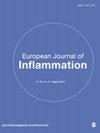富血小板血浆通过提升自噬改善脂多糖诱导的炎症反应
IF 0.8
4区 医学
Q4 IMMUNOLOGY
引用次数: 1
摘要
富血小板血浆(PRP)在伤口愈合的各个阶段都起着重要作用,包括炎症期。巨噬细胞自噬已被发现影响炎症反应过程。然而,PRP是否能通过巨噬细胞自噬影响炎症反应尚不清楚。在本研究中,我们探讨了PRP对炎症反应的影响,并研究了其潜在的机制。方法用PRP和/或脂多糖(LPS)处理RAW 264.7巨噬细胞。采用ELISA和qRT-PCR检测PRP对炎症因子表达的影响。用透射电镜和免疫荧光检测巨噬细胞自噬体。Western blot检测细胞自噬和nlrp3相关蛋白。结果PRP降低RAW 264.7细胞炎症因子水平,增加细胞自噬。3-MA(一种自噬抑制剂)预处理可以消除PRP对炎症反应的影响。此外,PRP通过激活NLRP3炎性体诱导巨噬细胞自噬。结论PRP可通过NLRP3增强自噬,从而减轻lps诱导的炎症反应。这些研究也为PRP治疗伤口愈合的分子机制提供了新的视角。本文章由计算机程序翻译,如有差异,请以英文原文为准。
Platelet-rich plasma improves lipopolysaccharide-induced inflammatory response by upgrading autophagy
Objectives Platelet-rich plasma (PRP) plays an important role at all stages of wound healing, including the inflammatory stage. Macrophage autophagy has been found to influence the inflammatory response process. However, it is unclear whether PRP can affect inflammatory responses via macrophage autophagy. In the present study, we explored the effect of PRP on inflammatory responses and researched the underlying mechanism. Methods RAW 264.7 macrophages were treated with PRP and/or lipopolysaccharide (LPS). The effects of PRP on the expression of inflammatory factors were determined by ELISA and qRT-PCR. Macrophage autophagosomes were also assessed by TEM and immunofluorescence. Autophagy and NLRP3-related proteins were investigated using Western blot analysis. Results PRP reduced the levels of inflammatory factors and increased autophagy in RAW 264.7 cells. Pretreatment with 3-MA, which is an autophagy inhibitor, abolished the impact of PRP on the inflammatory response. Moreover, PRP induced macrophage autophagy by activating the NLRP3 inflammasome. Conclusions These results show that PRP can attenuate LPS-induced inflammatory responses by enhancing autophagy via NLRP3. These study also provides a new perspective on the molecular mechanism of PRP therapy in wound healing.
求助全文
通过发布文献求助,成功后即可免费获取论文全文。
去求助
来源期刊
CiteScore
0.90
自引率
0.00%
发文量
54
审稿时长
15 weeks
期刊介绍:
European Journal of Inflammation is a multidisciplinary, peer-reviewed, open access journal covering a wide range of topics in inflammation, including immunology, pathology, pharmacology and related general experimental and clinical research.

 求助内容:
求助内容: 应助结果提醒方式:
应助结果提醒方式:


